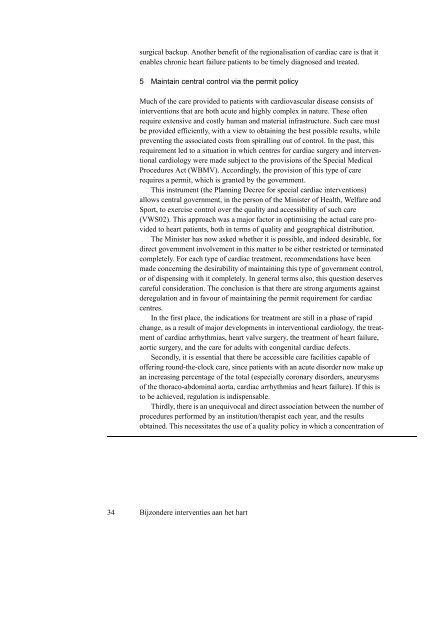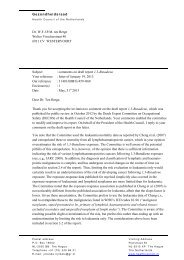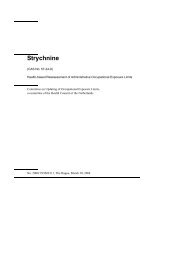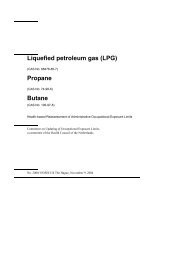- Page 1: Bijzondere interventies aan het har
- Page 5: Gezondheidsraad Health Council of t
- Page 8 and 9: De Gezondheidsraad, ingesteld in 19
- Page 10 and 11: 3.8 Waarborgen van toegankelijkheid
- Page 12 and 13: 12 Bijzondere interventies aan het
- Page 14 and 15: ewaking van de kwaliteit, toegankel
- Page 16 and 17: daan in ondermeer de VS en het Vere
- Page 18 and 19: ventiecardiologie onder de werking
- Page 20 and 21: vaker toegepast kunnen worden, kan
- Page 22 and 23: infarct. Tijdens de openhartoperati
- Page 24 and 25: geïntegreerd werkende centra. Het
- Page 26 and 27: operatief is gecorrigeerd, en die o
- Page 28 and 29: 28 Bijzondere interventies aan het
- Page 30 and 31: From time to time, of course, all s
- Page 32 and 33: esults to be assessed against accep
- Page 36 and 37: stenosis. The use of stents has bee
- Page 38 and 39: Treatment of coronary artery stenos
- Page 40 and 41: Meanwhile, it has also been found t
- Page 42 and 43: dures must be concentrated in centr
- Page 44 and 45: 44 Bijzondere interventies aan het
- Page 46 and 47: 1996 verleent zij daartoe vergunnin
- Page 48 and 49: In hoofdstuk 4 wordt aandacht beste
- Page 50 and 51: Tabel 1 Sterfte binnen de groep har
- Page 52 and 53: vaatziekten voorgedaan. Dit aantal
- Page 54 and 55: 54 Bijzondere interventies aan het
- Page 56 and 57: deze minister vervolgens het Planni
- Page 58 and 59: De indicatiestelling, behandeling e
- Page 60 and 61: 3.4 Planning volgens de levensloopg
- Page 62 and 63: Indicaties voor PCI bij patiënten
- Page 64 and 65: Tak06). Belangrijke vragen ten aanz
- Page 66 and 67: ij een centrum dat aan de vereisten
- Page 68 and 69: Toetsing van de NVVC-richtlijnen Na
- Page 70 and 71: 3.9 Waarborgen van betaalbaarheid e
- Page 72 and 73: is mogelijk mede ingegeven vanuit d
- Page 74 and 75: Na de introductie van PCI’s zijn
- Page 76 and 77: nog niet bereikt. Het is daarom gew
- Page 78 and 79: Groei in de periode na 2009 In 2009
- Page 80 and 81: 3.13 Conclusies en aanbevelingen In
- Page 82 and 83: Toelichting 2 Reistijd naar dichtst
- Page 84 and 85:
Toelichting De negentigminutengrens
- Page 86 and 87:
86 Bijzondere interventies aan het
- Page 88 and 89:
edraagt, wegens de sterk gestoorde
- Page 90 and 91:
a Behandeling bij supraventriculair
- Page 92 and 93:
Figuur 1 Mechanismen van supraventr
- Page 94 and 95:
Indicaties voor AF-chirurgie De hui
- Page 96 and 97:
Indicaties Bij het bepalen van de i
- Page 98 and 99:
9). Zij ziet het als ongewenst dat
- Page 100 and 101:
a b c Nieuwe mappingtechnieken; die
- Page 102 and 103:
onderliggend substraat. Bij ongevee
- Page 104 and 105:
4.3.3 Ontwikkelingen bij gedilateer
- Page 106 and 107:
4.3.8 Contra-indicaties voor ICD-th
- Page 108 and 109:
daar (weliswaar met een aanzienlijk
- Page 110 and 111:
4.4.3 Niveau bestaande centra Het n
- Page 112 and 113:
komst meer en meer behoefte ontstaa
- Page 114 and 115:
te voeren (vergunningen)beleid vere
- Page 116 and 117:
• Meerkanaalselektrofysiologie me
- Page 118 and 119:
Catheterablatieprocedures Om voldoe
- Page 120 and 121:
sche systemen is het van groot bela
- Page 122 and 123:
122 Bijzondere interventies aan het
- Page 124 and 125:
Risicofactoren en preventie De kans
- Page 126 and 127:
Als er aanwijzingen zijn voor een h
- Page 128 and 129:
sen van een inwendige defibrillator
- Page 130 and 131:
De commissie pleit er dan ook sterk
- Page 132 and 133:
5.4 Vergelijking van chirurgische e
- Page 134 and 135:
Gegevens over effectiviteit Uit ond
- Page 136 and 137:
wordt door het feit dat de ervaring
- Page 138 and 139:
Figuur 7 Procentuele afname van het
- Page 140 and 141:
Figuur 9 Aantal wachtenden voor een
- Page 142 and 143:
eleid, en welke vorm de registratie
- Page 144 and 145:
Report Card-systeem in New York als
- Page 146 and 147:
operaties per jaar. Dit wijkt af va
- Page 148 and 149:
• De commissie stelt voor om in o
- Page 150 and 151:
patiënten kwamen in aanmerking voo
- Page 152 and 153:
De resultaten van aortaklepimplanta
- Page 154 and 155:
gewaarborgd te kunnen worden als he
- Page 156 and 157:
156 Bijzondere interventies aan het
- Page 158 and 159:
wanneer in het ziekteproces van chr
- Page 160 and 161:
• Stadium B: Asymptomatische pati
- Page 162 and 163:
king komt voor een CRT-apparaat (Mo
- Page 164 and 165:
Destination therapy Wegens de benar
- Page 166 and 167:
van evidence-based richtlijnen, de
- Page 168 and 169:
geïntegreerde behandelingsmodalite
- Page 170 and 171:
ijvoorbeeld aandoeningen aan de kra
- Page 172 and 173:
Ingrepen aan de thoracale en thorac
- Page 174 and 175:
om dergelijke complexe ingrepen te
- Page 176 and 177:
176 Bijzondere interventies aan het
- Page 178 and 179:
gecorrigeerd. Wanneer volwassen pat
- Page 180 and 181:
komen te liggen op de ingewikkelder
- Page 182 and 183:
Huidige situatie Hoewel de aanbevel
- Page 184 and 185:
9.4 Behandeling van kinderen 9.4.1
- Page 186 and 187:
Op grond van statistische wetmatigh
- Page 188 and 189:
vaak als kind geopereerd zijn is vo
- Page 190 and 191:
Veel van deze aanbevelingen komen o
- Page 192 and 193:
Verwachte doorstroming naar gespeci
- Page 194 and 195:
Algemene conclusies en aanbevelinge
- Page 196 and 197:
B Scenario voor concentratiebeleid
- Page 198 and 199:
chirurgen, congenitaal cardiologen,
- Page 200 and 201:
10.1.3 Geïntegreerde zorg • Inte
- Page 202 and 203:
10.2 Conclusies en aanbevelingen pe
- Page 204 and 205:
10.2.3 Hartoperaties, algemeen •
- Page 206 and 207:
den verricht (zoals klepreconstruct
- Page 208 and 209:
208 Bijzondere interventies aan het
- Page 210 and 211:
AHA06 Ak06 Alk05 All01 All03 Ami97
- Page 212 and 213:
Ber04 Berger PB, Sketch MH, Jr., Ca
- Page 214 and 215:
Byr05 Byrne JG, Leacche M, Unic D,
- Page 216 and 217:
Dun04 Dundar Y, Hill RA, Bakhai A,
- Page 218 and 219:
Gri01 Grigioni F, Enriquez-Sarano M
- Page 220 and 221:
Hun05 Hunt e.a. ACC/AHA 2005 Guidel
- Page 222 and 223:
Kie06b Kies P, Bootsma M, Bax JJ, e
- Page 224 and 225:
McK88 McKenna WJ, Franklin RC, Niho
- Page 226 and 227:
Pap04 Pappone C, Oral H, Santinelli
- Page 228 and 229:
Sie01 Sie HT, Beukema WP, Ramdat MI
- Page 230 and 231:
Tag05 Taggart DP. Surgery is the be
- Page 232 and 233:
Wit03 Wittkampf FH, Vonken EJ, Derk
- Page 234 and 235:
234 Bijzondere interventies aan het
- Page 236 and 237:
Ook de verrichtingen die vallen ond
- Page 238 and 239:
• prof. dr. W.A. Helbing hooglera
- Page 240 and 241:
240 Bijzondere interventies aan het
- Page 242 and 243:
Miniconferentie Zorg voor patiënte
- Page 244 and 245:
Werkwijze Verschillende groeiscenar
- Page 246 and 247:
de bestaande productiemiddelen (per
- Page 248 and 249:
Uitwerking van de scenario’s Voor
- Page 250 and 251:
1 totale kosten PCI’s 2 variabele
- Page 252 and 253:
Deze methode leidt tot vrijwel deze
- Page 254 and 255:
Huidige situatie Scenario 1 Scenari
- Page 256 and 257:
• Welke verhouding electieve vs a
- Page 258 and 259:
• Hoe dient registratie te worden
- Page 260 and 261:
De NVVC stelt zich in deze op het s
- Page 262 and 263:
Dit is op zichzelf waar. Op low-vol
- Page 264 and 265:
Geïntegreerde zorg • Bent u het
- Page 266 and 267:
wachten wij dat dit onverminderd za
- Page 268 and 269:
Er is geen andere instantie dan de
- Page 270 and 271:
dig hartfalen is tot op heden een e
- Page 272 and 273:
Ja. Verandering van taken en samens
- Page 274 and 275:
noorden en het oosten van het land.
- Page 276 and 277:
• Hoe ziet u de rol van ‘hybrid
- Page 278 and 279:
De hartchirurgische zorg is onlosma
- Page 280 and 281:
mestoornissen. Alhoewel in absolute
- Page 282 and 283:
zoals inmiddels in vele studies is
- Page 284 and 285:
284 Bijzondere interventies aan het
- Page 286 and 287:
Transporttijd is ongetwijfeld een b
- Page 288 and 289:
kostenverzekering en zo’n 15% van
- Page 290 and 291:
en 08.00, (pO.01). Dit gold ook voo
- Page 292 and 293:
en maar zij kunnen niet de basis ve
- Page 294 and 295:
TabelH. 3b Relatie tusen aantal ver
- Page 296 and 297:
Literatuur 9 Smith SC Jr, Dove JT,
- Page 298:
298 Bijzondere interventies aan het
















